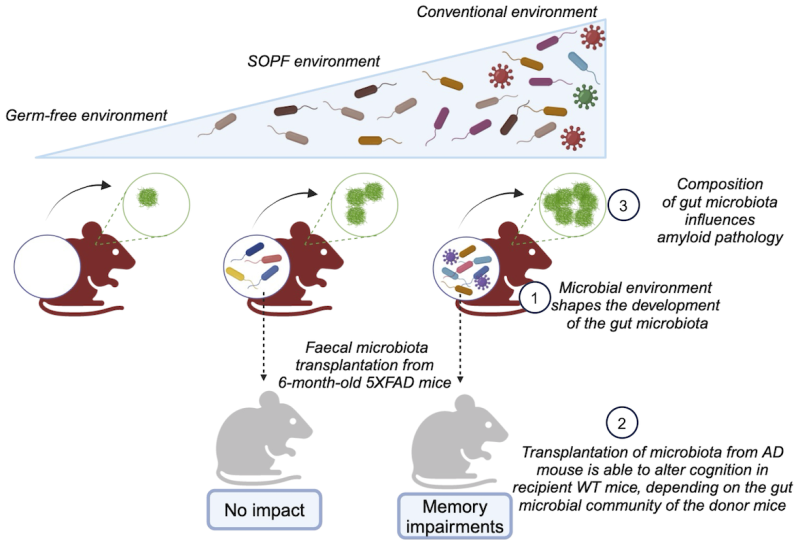Transfer of faecal microbiota from Alzheimer’s disease model mice housed in a conventional animal facility impairs cognition in recipient mice, an effect that disappears when the mice are housed in a controlled-status animal facility.
The gut microbiota, the community of microorganisms that colonise our intestines, plays an important role in our health. By influencing the gut-brain communication axis, these microbes regulate brain function and memory. An alteration in the gut microbiota, known as dysbiosis, has been observed in preclinical models of Alzheimer’s disease and in patients. Manipulating the composition of the gut microbiota can ameliorate or delay neuropathology and cognitive deficits in mouse models. The health status of the animal facility can strongly influence these results.
In this study, Caroline Ismeurt-Walmsley, a PhD student under the supervision of Sylvie Claeysen in the “Neuroproteomics and signalling of brain disorders” team led by Philippe Marin, carried out a longitudinal analysis of the composition of the faecal microbiota and amyloid pathology in Alzheimer’s disease model mice housed in a highly controlled sanitary environment (free of specific opportunistic pathogens – SOPF) and in a conventional environment. As expected, the housing conditions of the animals affected the composition of their gut microbiota. The gut microbiota of 6-month-old Alzheimer’s model mice reared in a conventional facility is altered and its transfer to healthy mice affects their cognition. Dysbiosis of the gut microbiota is absent in Alzheimer’s disease model mice housed in the SOPF animal facility, and transfer of their faecal microbiota has no effect on cognition in recipient animals.
These results demonstrate the strong influence of housing conditions on phenotypes associated with the microbiota and question the relevance of rearing preclinical models in facilities free of specific pathogens.
This study is the result of a collaboration between the IGF in Montpellier, the INP in Marseille (the “Neuronal Plasticity and Degeneration” team led by Santiago Rivera) and the company VAIOMER in Labège. This research was supported by Inserm’s Cross-Cutting program on Microbiota, the Occitanie region, the European Regional Development Fund (FEDER) and the ANR (MAD5 and DENTALCOG projects).
This work has just been published in the journal mBio.

Summary of the study. (1) Environmental microbial diversity influences the development of gut microbiota composition. (2) The effect of faecal microbiota transplantation from 6-month-old Alzheimer’s disease model mice on the cognition of recipient mice depends on the environment and the microbiota of the donor mice. (3) Gut microbiota influences amyloid pathology in Alzheimer’s disease model mice. SOPF: Specific and Opportunistic Pathogen Free.


